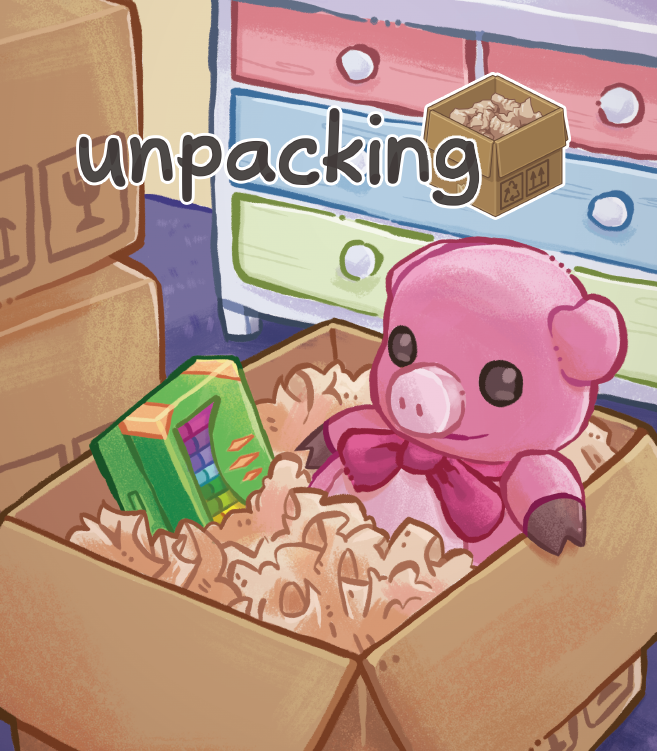You have just read a blog post written by Jason McIntosh.
If you wish, you can visit the rest of the blog, or subscribe to it via RSS. You can also find Jason on Twitter, or send him an email.
Thank you kindly for your time and attention today.

Played and enjoyed Unpacking, an interestingly minimalist narrative game released by Witch Beam in 2021. It tracks twenty years in the life of a young woman as she works through various trials and tribulations to land finally at career success and family fulfillment. The genius of it lay in how you experience her story: every level of the game represents one of many successive moves into new homes—starting with her first by-herself bedroom, as a young teenager. You learn about the progression of her life at every stage by unpacking all of her possessions from cardboard boxes, one at a time, and deciding where each one goes. And that’s it! You don’t see anyone, much less talk to anyone—you never even directly see the main character. All you get is her stuff, with every book, toothbrush, and chipped coffee mug rendered in wonderfully chunky pixel art.
The act of putting things away encourages you reflect on every item, and what it means for its owner. You can’t help but track subtle changes in her wardrobe over the years, and you note which silly tchotchkes from her college days she discards quickly and which she carries into her thirties, move after move. You watch as she gradually finds her focus, with more of her possessions bending towards a passion for making art—with a side order of healthy fandom. Just noting things like this makes up ninety percent of the game, and it works, even though there’s no boss-battle challenges where you must apply what you’ve learned about the character’s life in a race against time, or something. You just put more of her socks away, at your own pace.
The other ten percent happens during surprising moments of storytelling that emerge from occasional, carefully orchestrated difficulties encountered in placing objects. Oh, the heartbreak you feel when you realize that the tiny city apartment she’s moved into is too small—and too crowded with its current occupant’s belongings—to let her framed diploma fit anywhere other than under their bed. There are a couple of moments like that in her future, even subtler, and unforgettable.
In fact, it did take me a long time to understand that stuff already on the shelves and tabletops at the the start of a level were things that belonged to people she was moving in with, whether roommates or romantic partners. In every case, I vaguely thought that we joined the unpacking in medias res, for some reason, and that the main character’s interests over the years flitted from dressmaking to electric guitars and then back to drawing again. I mean she’s young, right? One tries out all kinds of stuff at that age. I figured it out in retrospect by the time the game inverts this pattern, with good reason.
Unpacking also helped me reflect on a particular aspect of sexuality shared by many contemporary indie games. As the story proceeded past its low point and promised new beginnings for the unseen hero, I felt positive that she’d end up with another woman, and: ah, wouldn’t you know it. The thing is, if she had ended the story paired with a man, the whole work would seem discordant, though not for any reason explicitly present in the text. Queerness has, I think, become a kind of genre expectation for short, interesting narrative games. The unnamed family that we briefly glimpse in the finale of Unpacking are the latest gay bildungsroman characters I’ve enjoyed accompanying for a few hours, a lineage I can trace back at least as far as the kids in Night in the Woods or Gone Home.
I actually have difficulty thinking of a center-stage heterosexual couple from any recent higher-profile indie game I’ve played in the last several years; the only ones who come to mind are Sam and Lydia from Paradise Killer. (And that’s overlooking the fact that Sam is a skeleton. But if Lydia can live with that, so can I.) I hypothesize that because heterosexuality remains the default in the larger popular culture, small-studio game creators feel encouraged to explore different directions when it comes to representing romance in their work.
Anyway, Unapcking is a great game. I can recommend it to anyone.
To share a response that links to this page from somewhere else on the web, paste its URL here.